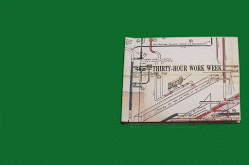The battle to save democracy continues. White man commits intentional voter fraud: A Marple Township man who illegally registered his dead mother as a Republican and cast a vote on her behalf in the 2020 presidential election has been sentenced to five years of probation, Delaware County prosecutors said.Bruce Bartman, 70, pleaded guilty to felony counts of perjury and unlawful voting last December after investigators discovered he had...
Read More »Disposable People
Disposable people are indispensable. Who else would fight the wars? Who would preach? Who would short derivatives? Who would go to court and argue both sides? Who would legislate? Who would sell red hots at the old ball game? For too long disposable people have been misrepresented as destitute, homeless, unemployed, or at best precariously employed. True, the destitute, the homeless, the unemployed and the precarious are indeed treated as...
Read More »Manufacturing and housing – turn even hotter
Two leading sectors of the economy – manufacturing, and housing – turn even hotter Last month I wrote that both the manufacturing and housing sectors were “on fire.” If anything, this month they turned white hot, with both construction spending and ISM manufacturing data at levels not seen in years. The overall ISM manufacturing reading rose from 58.7 to 60.8, tying the highest reading since the Great Recession, and indeed since 2004. The even...
Read More »Fucking With The Football
That would be the nuclear football, the one that a President of the United States can use to destroy all human life on the planet with by pushing some buttons. It turns out there is a second one, a backup, one that is kept near the backup President. That would be the Vice President. So CNN has put out a report that Tyler Cowen has picked up on and put as one of his daily news stories on Marginal Revolution, although barely commented on and not...
Read More »Information or propaganda? More Cowen on minimum wages
Today Tyler Cowen posted this: Remember the proposals for a $15 federal minimum wage? Employment would be reduced by 1.4 million workers, or 0.9 percent, according to CBO’s average estimate… That is from the new CBO report. Here is a bit more context: In an average week in 2025, the year when the minimum wage would reach $15 per hour, 17 million workers whose wages would otherwise be below $15 per hour would be directly affected, and...
Read More »Information or propaganda? More Cowen on minimum wages
Today Tyler Cowen posted this: Remember the proposals for a $15 federal minimum wage? Employment would be reduced by 1.4 million workers, or 0.9 percent, according to CBO’s average estimate… That is from the new CBO report. Here is a bit more context: In an average week in 2025, the year when the minimum wage would reach $15 per hour, 17 million workers whose wages would otherwise be below $15 per hour would be directly affected, and...
Read More »Tyler Cowen does political romance on minimum wages and covid relief
James Buchanan, one of the most influential free-market conservatives of the past half century, chastised liberals (progressives) for being romantic about politics. His work on Public Choice Theory urged us to look at “politics without romance”. Buchanan was right. Being overly romantic about politics can lead to serious error, but this error is by no means limited to liberals. Case in point: Tyler Cowen has recently been criticizing...
Read More »Tyler Cowen does political romance on minimum wages and covid relief
James Buchanan, one of the most influential free-market conservatives of the past half century, chastised liberals (progressives) for being romantic about politics. His work on Public Choice Theory urged us to look at “politics without romance”. Buchanan was right. Being overly romantic about politics can lead to serious error, but this error is by no means limited to liberals. Case in point: Tyler Cowen has recently been criticizing...
Read More »Debt and Summers II
Larry Summers has responded to his critics. My first thought is, yes he is still really smart. Also Olivier Blanchard also thinks the Covid Relief bill is too generous, and, in particular objects to the $1400 for most Americans. Note that Blanchard is the author of the main citation in my critique of Summers (although I should also have cited Summers on secular stagnation, Delong and Summers on the Keynesian Laffer Curve and Blanchard and...
Read More »Debt and Summers II
Larry Summers has responded to his critics. My first thought is, yes he is still really smart. Also Olivier Blanchard also thinks the Covid Relief bill is too generous, and, in particular objects to the $1400 for most Americans. Note that Blanchard is the author of the main citation in my critique of Summers (although I should also have cited Summers on secular stagnation, Delong and Summers on the Keynesian Laffer Curve and Blanchard and...
Read More » Heterodox
Heterodox


